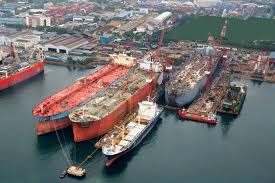
Korea’s shipbuilding industry took back its world leading position during the first half of the year, but there is one sector that might not feel so celebratory - the foreign exchange market.
As shipbuilders hedge their recent boom, market watchers are wondering whether increased sales of forward exchange contracts will drive up short-term foreign debt as they have done in the past, while government officials played down concerns.
Local shipbuilders locked down orders for 224 ships during the first half of this year, taking more than half the global market in terms of weight, according to the Ministry of Knowledge Economy.
“In 2011, we expect Korea’s three leading shipbuilders to secure orders worth nearly the record level set in 2007 in terms of won,” said Jeon Jae-cheon, an analyst at Daishin Securities.
However, the industry’s excitement might mean anxiety for the local foreign exchange market.
It takes about two to three years between a shipbuilder getting an order and receiving final payment for a ship. Because the payments are made in foreign currency - usually dollars - if the dollar’s value falls against the won in the meantime, the shipbuilder will earn less won.
In order to hedge the exchange risk, shipbuilders enter into a “forward exchange contract” with a local bank, where each party agrees to exchange dollars and won at a predetermined exchange rate in, say, two years.
This “forward rate” is usually a slightly discounted rate from the spot rate, or the current exchange rate.
The bank, which is obligated to give won for shipbuilders’ dollars two years on, also bears the risk of the dollar’s value falling more than the forward rate, and having to give out even more won for the same amount of dollars in two years.
To hedge against this exchange risk, the bank borrows dollars from abroad at very low interest rates and sells it in the domestic market while the dollar’s value is still high, to make profits that will cushion the bank from future losses from a weakening dollar.
In this way, banks flood the domestic market with dollars whenever they enter into forward exchange contracts with shipbuilders, which could nudge an already strong won past the breaking point for exporters and drive up short-term foreign debt.
In fact, during the industry’s record performance in 2007, local shipyards secured some $97.4 billion of orders - nine times the nearly $10 billion in 2002 - and of that, 55 percent or $53.2 billion won was hedged by forward contract sales, according to the Bank of Korea.
Such massive trading volume nudged the value of the won from a yearly average of 956 won per dollar in 2006 to 929 won in 2007, hurting exporters.
However, government officials said existing forward contracts that haven’t matured yet are one factor that will keep foreign debt increases at bay.
“Some sales of forward contracts completed before the first half of 2008 have still not matured due to rollovers,” said a BOK official. “The effects of existing forward contracts maturing and new ones being sold are expected to cancel each other out to an extent.”
Regulators also noted that Korea has adopted limits on banks’ foreign exchange positions and regulations against overhedging since 2007.
Source: Joongang Daily
We use cookies to improve your experience. By continuing to use our site, you accept our Cookies, Privacy Policy,Terms and Conditions. Close X